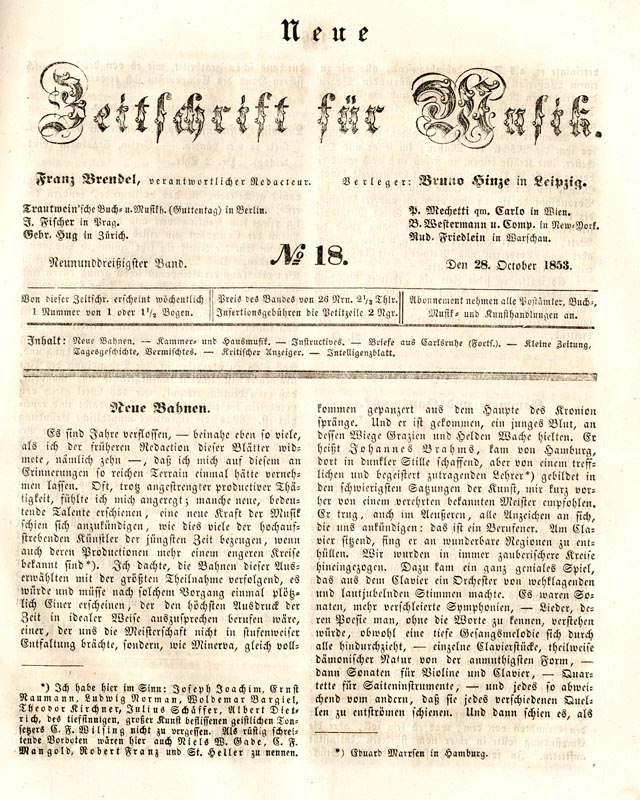Robert Schumann
Neue Bahnen
Neue Zeitschrift fr Musik
Vol. 39, no. 18 (October 28, 1853)
Leipzig: Hinze
Gilmore Music Library
 In 1845 Schumann relinquished his position as editor of the Neue Zeitschrift für Musik and focused his energies instead on composition. In the final decade of his life, he rarely wrote for publication, but his 1853 article about Johannes Brahms cast a shadow that lingered for decades. Brahms was only twenty years old and as yet little known; his most notable public achievement had been serving as piano accompanist on a concert tour by the violinist Eduard Remenyi. In the fall of 1853 he visited Robert and Clara Schumann in Düsseldorf, following a recommendation by Joseph Joachim. They quickly became close friends; Brahms stayed for about two weeks, and played many of his compositions (none of them yet published) for the Schumanns, who were profoundly impressed. Robert expressed his admiration first in a letter to Joachim, and then in an article for the Neue Zeitschrift, entitled “Neue Bahnen” (“New Paths”). He praised Brahms in extravagant language, proclaiming the arrival of a young musician “called to give expression to his times in ideal fashion: a musician who would reveal his mastery not in gradual stages but like Minerva would spring fully armed from Kronos’s head. And he has come; a young man over whose cradle Graces and Heroes have stood watch. His name is Johannes Brahms…” (translation from A Brahms Reader, by Michael Musgrave). Detecting a symphonic spirit in Brahms’s piano sonatas, Schumann urged the young composer to write for orchestra. This review helped establish Brahms’s reputation, but it also placed a heavy burden on his shoulders, and more than twenty years passed before he completed his first symphony.
In 1845 Schumann relinquished his position as editor of the Neue Zeitschrift für Musik and focused his energies instead on composition. In the final decade of his life, he rarely wrote for publication, but his 1853 article about Johannes Brahms cast a shadow that lingered for decades. Brahms was only twenty years old and as yet little known; his most notable public achievement had been serving as piano accompanist on a concert tour by the violinist Eduard Remenyi. In the fall of 1853 he visited Robert and Clara Schumann in Düsseldorf, following a recommendation by Joseph Joachim. They quickly became close friends; Brahms stayed for about two weeks, and played many of his compositions (none of them yet published) for the Schumanns, who were profoundly impressed. Robert expressed his admiration first in a letter to Joachim, and then in an article for the Neue Zeitschrift, entitled “Neue Bahnen” (“New Paths”). He praised Brahms in extravagant language, proclaiming the arrival of a young musician “called to give expression to his times in ideal fashion: a musician who would reveal his mastery not in gradual stages but like Minerva would spring fully armed from Kronos’s head. And he has come; a young man over whose cradle Graces and Heroes have stood watch. His name is Johannes Brahms…” (translation from A Brahms Reader, by Michael Musgrave). Detecting a symphonic spirit in Brahms’s piano sonatas, Schumann urged the young composer to write for orchestra. This review helped establish Brahms’s reputation, but it also placed a heavy burden on his shoulders, and more than twenty years passed before he completed his first symphony.
Only a few months after writing “Neue Bahnen” Schumann began to suffer from severe psychological disturbances, such as hearing imaginary voices and music. Fearing for his sanity (and for Clara’s safety), he asked to be institutionalized. After he tried to drown himself in the Rhine, he was taken to a psychiatric hospital in Endenich, not far from Düsseldorf. Unfortunately, no effective treatments were available, and his condition worsened until he died on July 29, 1856. Many scholars suspect that Schumann’s mental and physical disorders may have arisen at least in part from syphilis, contracted a quarter of a century earlier. Coincidentally, the same disease also killed Franz Schubert and Hugo Wolf, two other masters of German song.
Brahms maintained a close relationship with Clara while Robert was in the hospital and after his death. He dedicated several compositions to her, and the manuscript of one of these is also on display in this exhibit.
